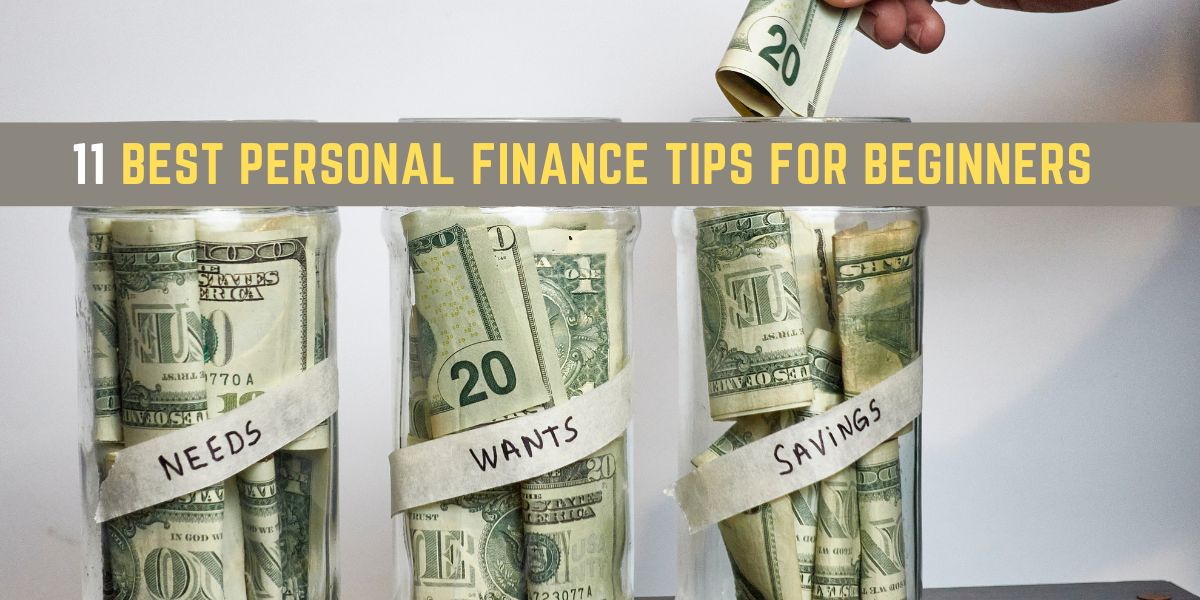Welcome to our comprehensive guide “the best personal finance tips for beginners“. Whether you’re just starting to manage your finances or looking to optimize your money management skills, these tips will help you achieve your financial goals.
In this article, we will cover essential personal finance advice, including creating a budget, saving regularly, paying off high-interest debt, establishing an emergency fund, investing early, managing credit, setting financial goals, automating your finances, educating yourself on personal finance, and prioritizing long-term financial planning.

By following these 11 personal finance tips for beginners, you can take control of your finances, build wealth, and secure your financial future.
- Creating a budget and tracking your expenses is crucial to gaining control over your finances.
- Saving regularly is essential for building wealth and financial security.
- Paying off high-interest debt should be a top priority to avoid unnecessary expenses.
- Establishing an emergency fund is crucial for unexpected expenses and financial security.
- Starting to invest early can help you build wealth and achieve your financial goals.
- Understanding and managing credit is important for avoiding unnecessary debt and maintaining a good credit score.
- Setting realistic financial goals and creating a plan to achieve them can help you stay focused and motivated.
- Automating your finances can help you save time and ensure bills, savings, and investments are paid on time.
- Educating yourself on personal finance can help you make informed financial decisions and optimize your money management skills.
- Prioritizing long-term financial planning, including retirement savings and estate planning, can help secure your financial future.
Create a Budget and Track Your Expenses
One of the most crucial money management tips for beginners is creating a budget and tracking expenses. If you don’t have a budget, it’s easy to spend too much and not know where your money is going. A budget will help you prioritize your expenses and make informed decisions about your spending.
To start budgeting, list all your income sources and expenses, including bills, groceries, transportation, and entertainment. Then, allocate a specific amount for each category, making sure that your expenses do not exceed your income. You can use online budgeting tools or apps to simplify the process.
Once you have a budget, track your expenses regularly to ensure that you are sticking to it. This will help you identify areas where you can cut back on unnecessary spending and find ways to save more money.

Create a Budget and Track Your Expenses
| Step | Description |
| Step 1 | List all your income sources |
| Step 2 | List all your expenses, including bills, groceries, transportation, and entertainment |
| Step 3 | Allocate a specific amount for each category |
| Step 4 | Track your expenses regularly to ensure that you are sticking to your budget |
In addition to budgeting, here are some useful money management tips to keep in mind:
- Pay bills on time to avoid late fees and interest charges
- Set saving goals and actively work towards them
- Cut your unnecessary expenses, like eating out or buying expensive clothes.
- Monitor your credit score and report to avoid surprise charges or errors
By following these personal finance advice for beginners, you can establish healthy money habits and take control of your finances.
Save Regularly
One of the most important money management tips for beginners is to save regularly. No matter how small your income is, make sure to allocate a portion of it towards savings every month. This could be as little as 5% of your income or as much as you can afford. Just make saving a habit.
Here are some savings tips for beginners:
- Set a realistic savings goal: Determine how much you want to save each month and for what purpose. Whether it’s for an emergency fund, a down payment on a home, or a vacation, having a specific goal will make it easier to stick to your savings plan.
- Automate your savings: Set up auto transfers from your checking account to your personal savings account each month. This will make saving a no-brainer and keep you on track towards reaching your savings goal.
- Reduce your expenses: Cut back on unnecessary expenses, such as eating out or buying new clothes, and redirect those funds towards your savings account.
- Start small: If you’re struggling to save, start with a small amount each month and gradually increase it as you get used to living on a slightly smaller budget.
By saving regularly, you’ll be able to build up a cushion for unexpected expenses, work towards your financial goals, and ultimately achieve greater financial freedom and security.
Pay Off High-Interest Debt
Having a lot of debt with high interest can make it hard to make progress with your money. It’s important to tackle it proactively to prevent interest charges from accumulating and growing the amount owed.
Begin by prioritizing debt with the highest interest rates. This might include credit card debt, personal loans, or payday loans.
You might want to think about merging your debts using a credit card that lets you transfer balances or a personal loan that charges less interest.
When making payments, pay more than the minimum required amount each month to reduce the balance faster. You can also try the snowball or avalanche method to pay off debt strategically.
If you’re struggling to keep up with debt payments, consider speaking with a financial advisor or credit counsellor for personalized debt management tips.
Additional Tips:
- Avoid taking on new debt while paying off existing debt.
- Consider negotiating with creditors for a lower interest rate or payment plan.
- Use windfalls, such as tax refunds or bonuses, to make extra debt payments.
Establish an Emergency Fund
Life can be unpredictable, and unexpected emergencies can quickly derail your finances. That’s why it’s crucial to have a savings fund you can rely on in case of unexpected expenses. An emergency fund is a separate savings account that you can tap into when you face unforeseen expenses, such as medical bills, car repairs, or a sudden job loss.
Building an emergency fund should be a top priority for all beginners. Take action by following experts’ advice: build an emergency fund covering three to six months of living expenses. Start small but stay consistent, even if it’s just a few dollars each week. Over time, it grows into a financial safety net.
How to Build an Emergency Fund
The following money management tips can help you start building an emergency fund:
- Set a specific savings goal: Determine how much you need to save for emergencies and set a savings goal. This simple step will keep you motivated and help you see how far you’ve come.
- Automate your savings: Set up an automatic transfer from your checking account to your emergency fund savings account each month to stay on track.
- Cut unnecessary expenses: Review your monthly expenses and look for areas where you can cut back, such as eating out or subscription services.
- Save windfalls: Whenever you receive a bonus, tax refund, or other unexpected income, put it directly into your emergency fund.
Remember, emergencies can happen at any time. By establishing an emergency fund, you’ll have peace of mind knowing that you can handle unexpected expenses without jeopardizing your financial stability.
Start Investing Early
Investing your money early is a smart move towards achieving long-term financial security. By starting early, you allow your investments to grow and compound over time, giving you higher returns. Here are best 3 investing tips for beginners:

- Start with a small amount: You don’t need a lot of money to start investing. Start with a small amount, and you can gradually increase your investment as you become more comfortable.
- Choose a diversified portfolio: Spread your investments across various asset classes like stocks, bonds, and mutual funds. This will reduce your risk and give you exposure to a range of investment opportunities.
- Invest for the long term: Investing is a long-term game. Don’t get swayed by short-term market fluctuations and instead focus on your long-term goals.
It’s important to remember that investing involves risk, and there’s no guarantee of returns. However, by investing early and wisely, you can create a secure financial future for yourself.
Understand and Manage Credit
Managing your credit is a critical aspect of personal finance. It impacts your ability to access loans, credit cards, rent an apartment, or even get a job. Here are some money management tips to help you understand and manage your credit:
Check Your Credit Report
Your credit report contains information on your credit history and helps lenders determine your creditworthiness. You can check your credit report for free once a year from the three major credit bureaus. This will help you identify any errors or fraudulent activities that could affect your credit score.
Understand Your Credit Score
Your credit score is a three-digit number that shows how trustworthy you are with credit. It goes from 300 to 850, and having a higher score means you’re seen as more reliable when it comes to borrowing money. A good credit score is typically above 700. Lenders use your credit score to assess the risk of lending you money.
Use Credit Wisely
Using credit wisely means not taking on more debt than you can afford, making payments on time, and not maxing out credit cards. To improve your credit score, keep your credit utilization ratio below 30%, pay your bills on time, and avoid opening too many new accounts in a short period.
Avoid Unnecessary Debt
It’s important to avoid debt that you can’t afford to pay off. High-interest credit card debt, payday loans, and car title loans can lead to a debt spiral. If you find yourself in this situation, consider seeking help from a nonprofit credit counselling agency.
By understanding and managing your credit, you can improve your credit score, save money on interest payments, and increase your chances of getting approved for loans and credit cards. These personal finance tips for beginners can help you get started on the path to financial success.
Set Financial Goals
Setting financial goals is crucial for effective financial planning. As a beginner, you may feel overwhelmed by the number of financial goals you want to achieve. However, it is essential to prioritize your goals and work towards them with a long-term perspective.
Financial planning tips for beginners:
- Start by identifying your short-term and long-term financial goals. Short-term goals may include paying off high-interest debt or building an emergency fund, while long-term goals may include saving for retirement or buying a house.
- Once you have identified your financial goals, create a plan to achieve them. To make your goals easier to reach, divide them into smaller, doable tasks and assign deadlines to each one.
- Continuously evaluate your progress towards your financial goals and make necessary adjustments to your plan if needed.
Personal finance advice:
Remember to be realistic with your financial goals. Do not set goals that are impossible to achieve or that may leave you in a worse financial situation. It is also important to monitor your progress towards your goals regularly to stay motivated and on track.
Finance tips for beginners:
It can be helpful to seek the advice of a financial advisor or use online resources to assist in goal-setting and financial planning. By setting and achieving financial goals, you can take control of your finances and work towards a secure financial future.
Automate Your Finances
Automating your finances can be a game-changer in managing your money effectively. It’s a smart way to ensure bills and payments are made on time without the risk of late fees or missed payments. Here are some money management tips to help you automate your finances:
Set up direct deposit: Arrange for your paycheck to be deposited directly into your bank account. This way, you won’t have to worry about physically depositing your check and can have access to your money immediately.
Set up automatic bill payments: Many banks offer the option to set up automatic bill payments, so you don’t need to remember to pay your bills every month. You can also schedule payments for recurring expenses such as rent, utilities, and insurance.
Automate your savings: Automating your savings is an easy way to save money regularly without even thinking about it. You can set up a direct deposit to a savings account, or use an app to save small amounts of money every time you make a purchase.
By automating your finances, you can save time, avoid late fees, and stay on top of your money management. It’s a personal finance advice for beginners that can help you build strong financial habits that will last a lifetime.
Educate Yourself on Personal Finance
Understanding personal finance is crucial for anyone seeking financial stability and independence. However, for beginners, the world of finance can be overwhelming, with complex terms and concepts.
To gain a better understanding of personal finance, start by reading books, blogs, or articles from reputable sources. Some popular personal finance books for beginners include “The Total Money Makeover” by Dave Ramsey, “Rich Dad Poor Dad” by Robert Kiyosaki, and “The Simple Path to Wealth” by JL Collins.
Another way to learn about personal finance is to take online courses or attend workshops. Many online courses are available for free, covering topics such as budgeting, saving, investing, and debt management.
Seeking advice from a financial advisor or planner can also be beneficial for beginners. They can help you create a personalized plan for your financial goals and provide advice on investments, insurance, and retirement planning.
Finally, don’t be afraid to ask questions and seek guidance from peers or family members who have experience with personal finance. Learning from their successes and mistakes can help you avoid common financial pitfalls and achieve your goals faster.
With these resources and a willingness to learn, anyone can become knowledgeable about personal finance. Remember that financial education is an ongoing process, and there is always more to learn.
Prioritize Long-Term Financial Planning
While it’s essential to establish good money habits and manage your finances in the short term, it’s also crucial to prioritize long-term financial planning.
This means considering your retirement savings, estate planning, and other financial goals that may take years or even decades to achieve.
As a beginner, it’s easy to focus on the here-and-now, but by prioritizing long-term planning, you’ll set yourself up for a secure and comfortable future.
One key aspect of long-term financial planning is retirement savings. Even if you’re young and just starting your career, it’s never too early to begin saving for retirement.
Consider opening a retirement account, such as an IRA or 401(k), and aim to contribute as much as you can afford each year. Take advantage of any employer matching contributions,and consider increasing your contributions over time as your income grows.
Another important area of long-term planning is estate planning. While it may not be a pleasant topic to think about, it’s important to have a plan in place for your assets and any dependents you may have in case of your untimely passing.
Consider working with a financial advisor or attorney to create a will, establish trusts, and designate beneficiaries for your accounts and assets.
By prioritizing long-term financial planning, you’ll not only secure your future but also gain peace of mind knowing that you’ve taken steps to protect yourself and your loved ones.
Conclusion
Managing personal finances can be overwhelming, especially for beginners. However, with the right approach and mindset, anyone can take control of their finances and achieve their financial goals.
The 11 best personal finance tips for beginners include creating a budget, saving regularly, paying off high-interest debt, establishing an emergency fund, starting to invest early, understanding and managing credit, setting financial goals, automating finances, educating oneself on personal finance, and prioritizing long-term financial planning.
Remember, financial success does not happen overnight. It requires discipline, patience, and consistent effort. So don’t be afraid to make mistakes and learn from them along the way.
By implementing these personal finance tips, you can improve your financial well-being and secure a better future for yourself. So start today and take the first step towards achieving financial freedom.
Read this Also : AI For Small Business: 82% Of Small Business Leaders Predict AI Disruption Within 5 Years
Best personal finance tips for beginners:
- Create a budget and track your expenses
- Save regularly
- Pay off high-interest debt
- Establish an emergency fund
- Start investing early
- Understand and manage credit
- Set financial goals
- Automate your finances
- Educate yourself on personal finance
- Prioritize long-term financial planning
FAQ
Q: What are the best personal finance tips for beginners?
A: The best personal finance tips for beginners include creating a budget and tracking expenses, saving regularly, paying off high-interest debt, establishing an emergency fund, starting to invest early, understanding and managing credit, setting financial goals, automating your finances, educating yourself on personal finance, and prioritizing long-term financial planning.
Q: Why is creating a budget and tracking expenses important?
A: Creating a budget and tracking expenses is important because it helps you gain control over your personal finances. It allows you to see where your money is going, identify areas where you can save, and make informed financial decisions.
Q: How can I start saving regularly?
A: To start saving regularly, you can set a specific savings goal, automate your savings by setting up automatic transfers from your paycheck or checking account, and cut back on unnecessary expenses. It’s also helpful to create a separate savings account to keep your savings separate from your everyday spending.
Q: Why is it important to pay off high-interest debt?
A: Paying off high-interest debt is important because it can save you money in the long run. High-interest debt, such as credit card debt, can accumulate quickly and cost you a significant amount of interest over time. By paying off this debt, you can free up more money to save and invest.
Q: How do I establish an emergency fund?
A: To establish an emergency fund, you can start by setting aside a small amount of money from each paycheck and gradually increase the amount over time. Aim to save at least three to six months’ worth of living expenses in your emergency fund to cover unexpected financial emergencies.
Q: Why should I start investing early?
A: Starting to invest early allows you to take advantage of compound interest and potentially earn higher returns over time. By investing early, you give your investments more time to grow, increasing your chances of achieving long-term financial goals.
Q: How can I understand and manage credit?
A: To understand and manage credit, it’s important to regularly check your credit score and report, use credit responsibly by making payments on time and keeping credit card balances low, and avoid unnecessary debt by only borrowing what you can afford to repay.
Q: How do I set financial goals?
A: To set financial goals, start by identifying your short-term and long-term financial objectives. Make your goals specific, measurable, achievable, relevant, and time-bound (SMART), and create a plan to achieve them. Regularly review and adjust your goals as needed.
Q: What are the benefits of automating my finances?
A: Automating your finances can make money management easier and more convenient. By automating bill payments, savings, and investments, you ensure that your financial responsibilities are taken care of consistently and on time, helping you stay on track with your financial goals.
Q: How can I educate myself on personal finance?
A: You can educate yourself on personal finance by reading books, attending seminars or workshops, listening to podcasts, and following reputable financial websites and blogs. Taking the time to increase your financial knowledge will empower you to make better financial decisions.
Q: Why is prioritizing long-term financial planning important?
A: Prioritizing long-term financial planning is important because it allows you to prepare for future financial needs, such as retirement and estate planning. By starting early and making informed decisions, you can secure a comfortable and financially stable future for yourself and your loved ones.

